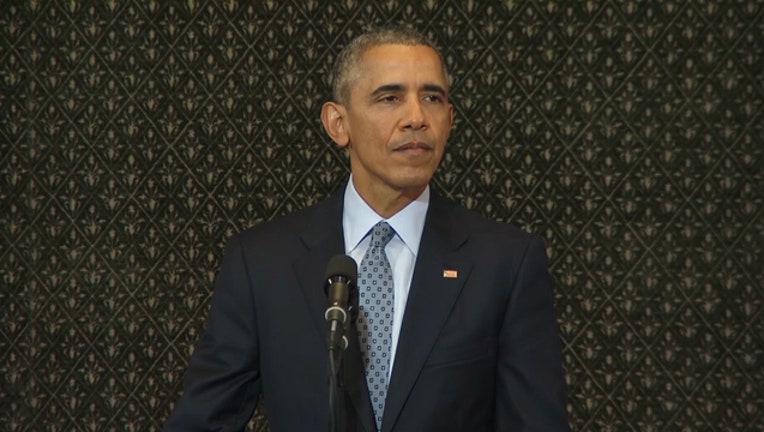Many Vietnam vets say they support lifting of arms embargo

CHICAGO (AP) - The way Terry Neilen sees it, lifting the ban on U.S. arms sales to Vietnam makes sense in the face of China's growing influence in the region.
Fellow Vietnam veteran Ned Foote said Americans long ago forgave Germany and Japan for World War II, so there's no reason not to do the same with Vietnam.
"We're actually acting as a team in a sense," said Neilen, of Saratoga Springs, New York, who served in the Army infantry in Vietnam in 1967 and 1968. "They're joining together to give a show of strength."
Foote, who heads the New York State Council of Vietnam Veterans of America, noted that the Vietnamese have helped account for missing American service members.
President Barack Obama's decision to lift the half-century-old arms embargo was seen Monday by many veterans as a logical outgrowth of efforts to normalize relations between the U.S. and the southeast Asian nation that has become a major trading partner since the war ended in 1975.
Obama, looking to bolster a government regarded as a crucial ally in the region, vowed to leave behind the troubled history between the former enemies and embrace a new era. He steered clear of any condemnation of Vietnam for its treatment of dissidents.
"The war's over," said Bernard Edelman, deputy director of government affairs for the Vietnam Veterans of America.
He said the organization has not taken an official position on the president's action, but he compared it to U.S. efforts after World War II to normalize relations with Japan, Germany, Austria and Italy.
"We've tried to build bridges to the Vietnamese," Edelman said, while acknowledging that people "whom I know and love and respect might be angry at what the president's doing."
Robert Turner, 68, of North Andover, Massachusetts, said he is "totally opposed" to allowing arms sales to Vietnam.
"We thought we were fighting communism, and now they want to give them arms," said Turner, who served in Vietnam in 1967 and 1968. "I'm not over it yet."
Al Huber, 69, is president of the Illinois state council of the Vietnam Veterans of America. He said he's not worried about whether that country gets weapons, but he doesn't think Obama's decision to lift the embargo near the end of his presidency "serves any purpose except his personal agenda."
Obama said the move would ensure Vietnam can defend itself but denied it was in response to territorial disputes with China in the South China Sea. China has warned the U.S. not to take sides, and Obama said the nation supports a diplomatic resolution.
Still, human rights activists and some American lawmakers had urged Obama to press Vietnam's communist leadership to offer greater freedoms before lifting the embargo. Vietnam holds about 100 political prisoners, and there have been more detentions this year. Some rank-and-file veterans echoed those concerns.
"They have plenty of human rights violations to account for, and I don't feel it's really appropriate to provide arms to them until we can see they're more in line with our ... way of human rights," said Air Force veteran Jesse Hawk of Marietta, Georgia, who served in Vietnam from 1971 to 1973.
He acknowledged China's growing influence but added, "Until there's any kind of action, there's no need to go providing arms to a country that still has their own problems to deal with when you don't know if it'll be used against their own people."
Cliff Stone, of North Andover, Massachusetts, said he served in the first cavalry in Vietnam and he fears that arming the country could create a conflict with China.
"We're supposed to be making peace with China, yet we will supply Vietnam with weapons. What sense does that make?" Stone said.
Obama did not say how soon arms sales might begin. He said each deal would be reviewed individually.
Neither the American Legion nor the Veterans of Foreign Wars has taken a position on the embargo, officials said.
But under a resolution adopted two years ago, the American Legion opposes the sale of long-range ballistic missiles, as well as nuclear or biological weapons, to communist nations, spokesman John Raughter said.
The group recognizes "that the president must be the chief architect of U.S. foreign policy," said Raughter, adding that the organization would "study the situation very carefully" and discuss it at its national convention this summer.
"We realize there are a lot of factors at play, including China ... but we also remain concerned about the human rights situation in Vietnam."
Army veteran Willie Guzman, who served in Vietnam from 1969 to 1971, said that, as commander in chief, Obama had the right to lift the embargo.
"They're an ally of ours now," he said. "I think they should be able to work together as a unit, you know, so we can help protect the freedom of that country as well."
___
Carola reported from Albany, New York. Associated Press writer Dan Elliott in Denver and AP video journalist Johnny Clark in Marietta, Georgia, also contributed to this report.

